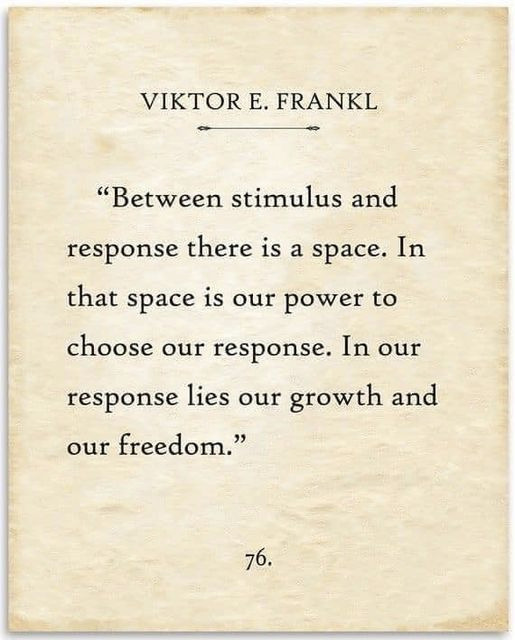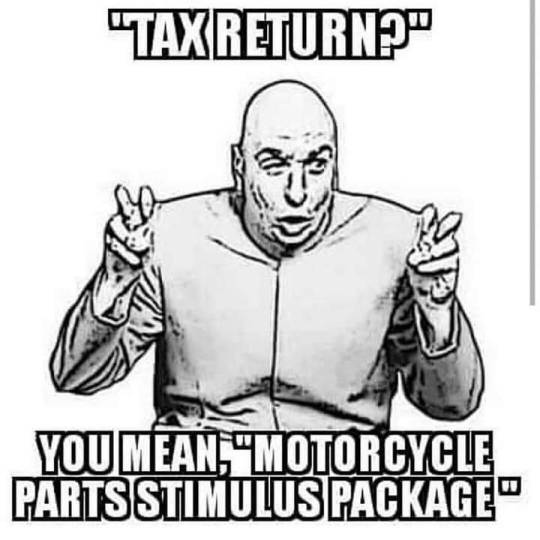#stimulus
Text
Precaratize bosses
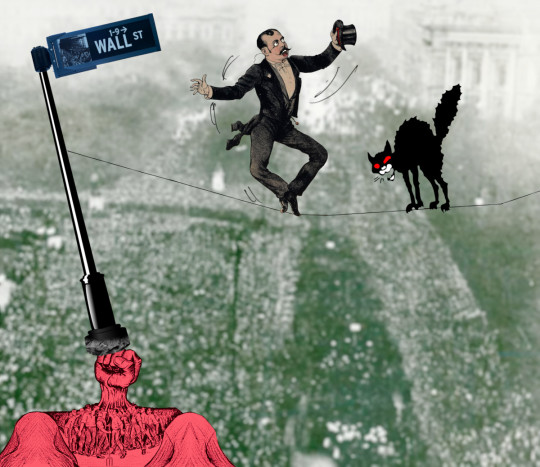
I'm touring my new, nationally bestselling novel The Bezzle! Catch me SUNDAY (Apr 21) in TORINO, then Marin County (Apr 27), Winnipeg (May 2), Calgary (May 3), Vancouver (May 4), and beyond!

Combine Angelou's "When someone shows you who they are, believe them" with the truism that in politics, "every accusation is a confession" and you get: "Every time someone accuses you of a vice, they're showing you who they are and you should believe them."
Let's talk about some of those accusations. Remember the moral panic over the CARES Act covid stimulus checks? Hyperventilating mouthpieces for the ruling class were on every cable network, complaining that "no one wants to work anymore." The barely-submerged subtext was their belief that the only reason people show up for work is that they're afraid of losing everything – their homes, their kids, the groceries in their fridge.
This isn't a new development. Back when Clinton destroyed welfare, his justification was that "handouts" make workers lazy. The way to goad workers off their sofas (and the welfare rolls) and into jobs was to instill fear in them:
https://www.theatlantic.com/business/archive/2018/03/welfare-childhood/555119/
This is also the firm belief of tech bosses: for them, mass tech layoffs are great news, because they terrorize the workers you don't fire, so that they'll be "extremely hardcore" and put in as many extra hours as the company demands, without even requiring any extra pay in return:
https://fortune.com/2022/10/06/elon-musk-jason-calacanis-return-to-office-gentlemens-layoffs-twitter/
Now, there's an obvious answer to the problem of no one taking a job at the wage being offered: just increase the offer. Capitalists claim to understand this. Uber will tell you that surge pricing "incentivizes drivers" to take to the streets by offering them more money to drive during busy times:
https://www.uber.com/blog/austin/providing-rides-when-they-are-most-needed/
(Note that while Uber once handed the lion's share of surge price premiums to drivers, these days, Uber just keeps the money, because they've entered the enshittification stage where drivers are so scared of being blacklisted that Uber can push them around instead of dangling carrots.)
(Also note that this logic completely fails when it comes to other businesses, like Wendy's, who briefly promised surge-priced hamburgers during busy times, but without even the pretense that the surge premium would be used to pay additional workers to rush to the restaurant and increase the capacity:)
https://www.theguardian.com/food/2024/feb/27/wendys-dynamic-surge-pricing
So bosses knew how to address their worker shortage: higher wages. You know: supply and demand. For bosses, the issue wasn't supply, it was price. A worker who earns $10/hour but makes the company $20 profit every hour is splitting the surplus 50:50 with their employer. The employer has overheads (rent on the shop, inventory, advertising and administration) that they have to pay out of their end of that surplus. But workers also have overheads: commuting costs, child-care, a professional wardrobe, and other expenses the worker incurs just so they can make money for their boss.
There's no iron law of economics that says the worker/boss split should be 50/50. Depending on the bargaining power of workers and their bosses, that split can move around a lot. Think of McDonald's and Walmart workers who work for wildly profitable corporate empires, but are so badly paid that they have to rely on food stamps. The split there is more like 10/90, in the boss's favor.
The pandemic changed the bargaining power. Sure, workers got a small cushion from stimulus checks, but they also benefited from changes in the fundamentals of the labor market. For example, millions of boomers just noped out of their jobs, forever, unwilling to risk catching a fatal illness and furious to realize that their bosses viewed that as an acceptable risk.
Bosses' willingness to risk their workers' lives backfired in another way: killing hundreds of thousands of workers and permanently disabling millions more. Combine the boomer exodus with the workers who sickened or died, and there's just fewer workers to go around, and so now those workers enjoy more bargaining power. They can demand a better split: say, 75/25, in their favor.
Remember the 2015 American Airlines strike, where pilots and flight attendants got a raise? The eminently guillotineable Citibank analyst Kevin Crissey declared: "This is frustrating. Labor is being paid first again. Shareholders get leftovers":
https://www.thestreet.com/investing/american-airlines-flight-attendants-bash-citi-analyst-who-put-shareholders-before-workers-14134309
Now, obviously, the corporation doesn't want to offer a greater share of its surplus to its workforce, but it certainly can do so. The more it pays its workers, the less profitable it will be, but that's capitalism, right? Corporations try to become as profitable as they can be, but they can't just decree that their workers must work for whatever pay they want to offer (that's serfdom).
Companies also don't get to dictate that we must buy their goods at whatever price they set (the would be a planned economy, not a market economy). There's no law that says that when the cost of making something goes up, its price should go up, too. A business that spends $10 to make a widget you pay $15 for has a $5 margin to play with. If the business's costs go up to $11, they can still charge $15 and take $1 less in profits. Or they can raise the price to $15.50 and split the difference.
But when businesses don't face competition, they can make you eat their increased costs. Take Verizon. They made $79b in profit last year, and also just imposed a $4/month service charge on their mobile customers due to "rising operational costs":
https://www.reddit.com/r/LateStageCapitalism/comments/1c53c4p/79bn_in_profits_last_year_but_you_need_an_extra/
Now, Verizon is very possibly lying about these rising costs. Excuseflation is rampant and rising, as one CEO told his investors, when the news is full of inflation-talk, "it’s an opportunity to increase the prices without getting a whole bunch of complaining from the customers":
https://pluralistic.net/2023/03/11/price-over-volume/#pepsi-pricing-power
But even stipulating that Verizon is telling the truth about these "rising costs," why should we eat those costs? There's $79b worth of surplus between Verizon's operating costs and its gross revenue. Why not take it out of Verizon's bottom line?
For 40 years, neoliberal economists have emphasized our role as "consumers" (as though consumers weren't also workers!). This let them play us off against one-another: "Sure, you don't want the person who rings up your groceries to get evicted because they can't pay their rent, but do you care about it enough to pay an extra nickel for these eggs?"
But again, there's no obvious reason why you should pay that extra nickel. If you have the buying power to hold prices down, and workers have the labor power to keep wages up, then the business has to absorb that nickel. We can have a world where workers can pay their rent and you can afford your groceries.
So how do we get bosses to agree to take less so we can have more? They've told us how: for bosses, the thing that motivates workers to show up for shitty jobs is fear – fear of losing their homes, fear of going hungry.
When your boss says, "If you don't want to do this job for minimum wage, there's someone else who will," they're telling you that the way to get a raise out of them is to engineer things so that you can say, "If you don't want to pay me a living wage for this job, there's someone else who will."
Their accusation – that you only give someone else a fair shake when you're afraid of losing out – is a confession: to get them to give you a fair shake, we have to make them afraid. They're showing us who they are, and we should believe them.
In her Daily Show appearance, FTC chair Lina Khan quipped that monopolies are too big to care:
https://www.youtube.com/watch?v=oaDTiWaYfcM
Philosophers of capitalism are forever praising its ability to transform greed into public benefit. As Adam Smith put it, "It is not from the benevolence of the butcher, the brewer, or the baker, that we expect our dinner, but from their regard to their own interest." The desire to make as much money as possible, on its own, doesn't produce our dinner, but when the butcher, the brewer and the baker are afraid that you will take your labor or your wallet elsewhere, they pay more and charge less.
Capitalists don't want market economies, where they have to compete with one another, eroding their margins and profits – they want a planned economy, like Amazon, where Party Secretary Bezos and his commissars tell merchants what they can sell and tell us what we must pay:
https://pluralistic.net/2024/03/01/managerial-discretion/#junk-fees
Capitalists don't want free labor, where they have to compete with rival capitalists to bid on their workers' labor – they want noncompetes, bondage fees, and "training repayment agreement provisions" (TRAPs) that force their workers to stay in dead-end jobs rather than shopping for a better wage:
\https://pluralistic.net/2022/08/04/its-a-trap/#a-little-on-the-nose
Capitalists hate capitalism, because capitalism only works if the capitalists are in a constant state of terror inspired by the knowledge that tomorrow, someone smarter could come along and open a better business, poaching their customers and workers, and putting the capitalist on the breadline.
https://pluralistic.net/2024/04/18/in-extremis-veritas/#the-winnah
Being in a constant precarious state makes people lose their minds, and capitalists know it. That's why they work so hard to precaratize the rest of us, saddling us with health debt, education debt, housing debt, stagnating wages and rising prices. It's not just because that makes them more money in the short term from our interest payments and penalties. It's because it de-risks their lives: monopolies and cartels can pass on any extra costs to consumers, who'll eat shit and take it:
https://pluralistic.net/2022/02/02/its-the-economy-stupid/#overinflated
A workforce that goes to bed every night worrying about making the rent is a workforce that put in unpaid overtime and thank you for it.
Capitalists hate capitalism. You know who didn't hate capitalism? Karl Marx and Freidrich Engels. The first chapter of The Communist Manifesto is just these two guys totally geeking out about how much cool stuff we get when capitalists are afraid and therefore productive:
https://pluralistic.net/SpectreHaunting
But when capitalists escape their fears, the alchemical reaction that converts greed to prosperity fizzles, leaving nothing behind but greed and its handmaiden, enshittification. Google search is in the toilet, getting worse every year, but rather than taking reduced margins and spending more fighting spam, the company did a $80b stock-buyback and fired 12,000 skilled technologists, rather than using that 80 bil to pay their wages for the next twenty-seven years:
https://pluralistic.net/2024/02/21/im-feeling-unlucky/#not-up-to-the-task
Monopoly apologists like to argue that monopolists can rake in the giant profits necessary to fund big, ambitious projects the produce better products at lower prices and make us all better off. But even if monopolists can spend their monopoly windfalls on big, ambitious projects, they don't. Why would they?
If you're Google, you can either spend tens of billions on R&D to keep up with spam and SEO scumbags, or you can spend less money buying the default search spot on every platform, so no one ever tries another search engine and switches:
https://pluralistic.net/2024/04/04/teach-me-how-to-shruggie/#kagi
Compared to its monopoly earnings, the tech sector's R&D spending is infinitesimal:
https://pluralistic.net/2020/08/11/nor-glom-of-nit/#capitalists-hate-competition
How do we get capitalists to work harder to make their workers and customers better off? Capitalists tell us how, every day. We need to make them afraid.

If you'd like an essay-formatted version of this post to read or share, here's a link to it on pluralistic.net, my surveillance-free, ad-free, tracker-free blog:
https://pluralistic.net/2024/04/19/make-them-afraid/#fear-is-their-mind-killer

Image:
Vlad Lazarenko (modified)
https://en.m.wikipedia.org/wiki/File:Wall_Street_Sign_%281-9%29.jpg CC BY-SA 3.0
https://creativecommons.org/licenses/by-sa/3.0/deed.en
#pluralistic#petard#precarity#cares act#stimulus#market discipline#competition#too big to care#antitrust#labor#trustbusting#consumer welfare#every accusation is a confession
150 notes
·
View notes
Text
Therapy isn't enough. I need to be ensconced within the wind chime section of my local garden store while a gentle breeze blows through. No thoughts, only soft bing-bong.

239 notes
·
View notes
Text

#iviprofen#gay artists#gay#stimulus#gayart#gay fantasy art#gay fantasy#newblvotg#gay art#art#male art
63 notes
·
View notes
Text





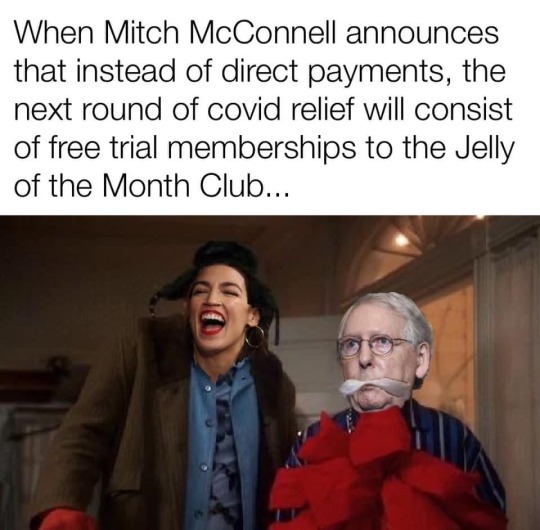
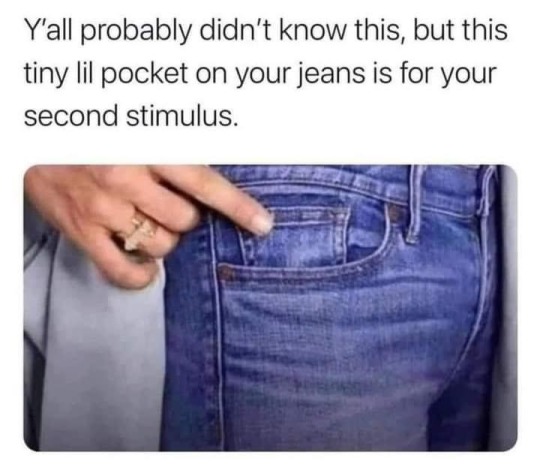




mitch mcconnell memes
#stingy old man#mitch mcconnell#stimulus#600 stimulus#old senators#turtle boy mitch#political memes#pathetic3#dankest memes#tumblr memes#mst memes#mystery sovcit theater memes#garth nader memes#mistaken con man
23 notes
·
View notes
Photo

page 182 - this is what a tree line looks like from a distance. You know there are going to be so many mushrooms on that forest floor.
But as you run towards the forest, anticipating the mushrooms and the high, you don’t get closer. Instead the horizon is rolling and rolling out beneath your feet. You want to get there so badly but the trees are only growing taller not closer. they’re too tall now, the space below them is going to be windswept and dry, can the fruiting bodies of the mushrooms even grow in that environment?
or have you already eaten the mushrooms. Me. Have I?
#biology#biologist#zoology#zoologist#nonstimulated nerve#nerve#nonstimulated#local current#local#membrane polarity reversed#stimulus#stimulus causes membrane polarity reversal#membrane repolarization#propogate#nerve impulses propagated away#reconstituted#reconstitution of membrane potential#diagram illustrating the nature of the nerve impuls consecutive periods of time are represented from top ot bottom#tree#forest#nature#natural#wood#harvest#pine#western cedar#general sherman#ents#mushrooms#neo-psychedelia
184 notes
·
View notes
Text
finding the correct background noise/auditory stimulus when trying to get work done is like finally getting a breath of air when drowning
4 notes
·
View notes
Text
Don't stop because you are you....
2 notes
·
View notes
Quote
Paul’s heart bursts with the most passionate expressions of his desire for relief, “Who will deliver me from this body of death?” My goodness! If this were the attitude of the saints when they considered indwelling sin, they would be far more committed to its extermination, especially if we added the rage and power stimulated by a specific lust!
John Owen
7 notes
·
View notes
Text

My plants get excited whenever a plant or tree comes on the TV.
#seeingfrens#landscape#myplants#exciting#seeingotherplants#trees#comesonTV#nature#jealous#makessense#familiar#stimulus#acrylic#dailyartwork#artoftheday#artists on tumblr#artwork#outsiderart#lowbrowart#painting#flommist#kunst#flomm#beermat#beercoaster#bierdeckel#handpaintedbeercoaster#perspective
2 notes
·
View notes
Text
A fun thing about my particular brand of neurodivergence (bipolar, generalised anxiety, adhd - all medicated and honestly, doing fine) that most other spicy brained people I know don’t seem to get is that I need constant, loud, bright stimulus all the time. Give me a busy grocery store with fluorescent lighting; a busy bar with a hundred different, loud conversations; video games with all the flashy visuals and noises, that require constant use of my hands (pinball machines are excellent for this); a YouTube video on in the background all the time.
Give me anything louder than my brain to make it go quiet.
6 notes
·
View notes
Text
Between stimulus and response there is a space. In that space lies our freedom and power to choose our response. In our response lies our growth and freedom.
Victor E. Frankl
14 notes
·
View notes
Photo

page 182 - see, this is what I mean. This forest is not right.
#biology#biologist#zoology#zoologist#nonstimulated nerve#nerve#nonstimulated#local current#local#membrane polarity reversed#stimulus#stimulus causes membrane polarity reversal#membrane repolarization#propogate#nerve impulses propagated away#reconstituted#reconstitution of membrane potential#diagram illustrating the nature of the nerve impuls consecutive periods of time are represented from top ot bottom#tree#forest#nature#natural#wood#harvest#pine#western cedar#general sherman#ents#tall trees#redwood
77 notes
·
View notes
Text

No Comment 84 : Continuum Infinitum
"Continuum Infinitum" unfolds before your eyes by revealing finer and finer details emanating from a single point. It is a meditation on the mechanics of time and space as infinite and seamless processes. The film is designed to loop so it essentially has no beginning and no end.
As you watch the movie for a minute or so and then look away, you will experience a mild optical illusion that feels as if everything you look at is shrinking away from you. This is caused by the motion after-effect (MAE). It is a visual illusion experienced after viewing a moving visual stimulus for a time (tens of milliseconds to minutes) with stationary eyes, and then fixating on a stationary stimulus. The stationary stimulus appears to move in the opposite direction to the original (physically moving) stimulus. The motion aftereffect is believed to be the result of motion adaptation.
Explanation:
Neurons coding a particular movement reduce their responses with time of exposure to a constantly moving stimulus; this is neural adaptation. Neural adaptation also reduces the spontaneous, baseline activity of these same neurons when responding to a stationary stimulus. One theory is that perception of stationary objects, for example rocks beside a waterfall, is coded as the balance among the baseline responses of neurons coding all possible directions of motion. Neural adaptation of neurons stimulated by downwards movement reduces their baseline activity, tilting the balance in favor of upwards movement.
Continuum Infinitum (c) 2012 by Ben Ridgway
Watch No Comment 83 : HERE
5 notes
·
View notes
Text
Sue the U.S. Treasury via the Federal Tort Claims Act for negligence in not doing their due diligence when distributing COVID-19 economic relief.
1 note
·
View note
